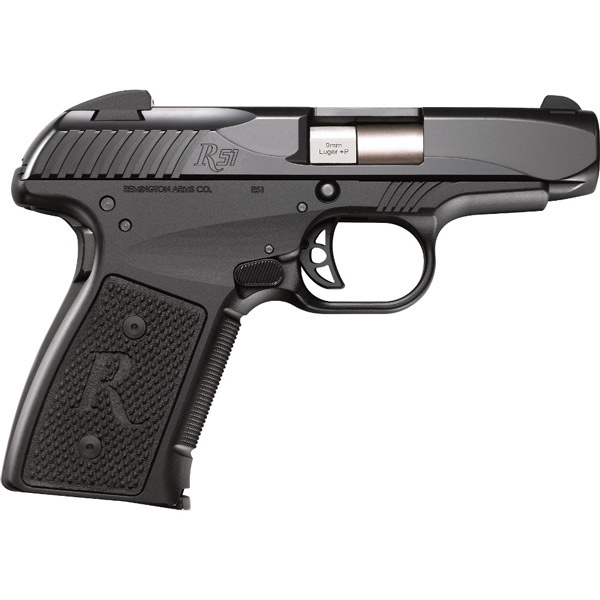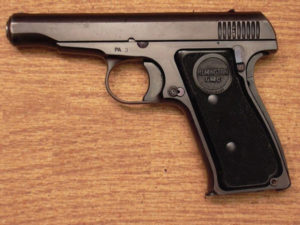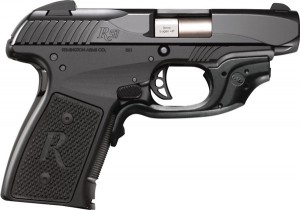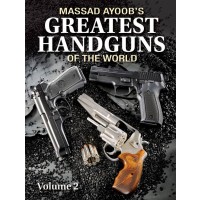

With its sleek lines and innovative action, the Remington R51 is one of the most futuristic pistols released at SHOT Shot 2014. But looks can be deceiving, because at its foundation is a nearly century-old design.
Entering the 2014 SHOT Show, expectations ran high that a single-stack 9mm tailored for concealed carry would steal the spotlight.
It has. But the manufacturer of the handgun is the shocking angle of this story. After all, Remington typically makes waves with shoulder-fired guns, not in the world of pistols.
Big Green, however, appears to have produced the handgun everyone is talking about in Las Vegas with the introduction of the R51. That should be rephrased — it is the reintroduction of the gun, since the pistol is the next generation of the Model 51, a design that has actually been around for nearly a century.
The pistol was the brainchild of John Douglas Pedersen, a firearms designer John Browning regarded as the greatest in the world. While the first iterations of the Model 51 drew plenty of attention, the pistol never really caught on despite its innovations. Though, General George S. Patton found it intriguing enough to own one.
Technology that was ahead of its time when it was patented in 1915, however, might have found its place in today’s world.
Pedersen’s action — what R.K. Wilson called a “Momentum Block System” in the Textbook of Automatic Pistols — is what makes the Model 51 and the R51 unique. It is neither a blowback nor recoil system, but an elegant amalgamation of both actions.
At first blush, the pistols look and function like a blowback systems. The guns have fixed barrels, with the recoil spring seated around them. And when fired, both guns' breechblocks and slides move together. Where the recoil action comes to play is in the use of its locking breechblock. In each pistol's case, the blocks locks into the frame a short distance after a round has been fired. The space allows for safe levels of chamber pressure and a reduction in recoil, functioning much more like a recoil action at this point.
While the mechanics of Pedersen’s action are somewhat foreign to modern shooters it has some advantages.
Donald M. Simmons recognized two in his article on the Model 51, appearing in the 1979 Gun Digest Annual. First, it allows a simple blowback action to be used in high-powered pistols, since it reduces chamber pressure. Secondly, it permits a lighter slide and a svelte firearm design, since it does not require the robust system typical of pure blowback actions.
These elements make the action perfect for a simple and lightweight concealed carry pistol that packs plenty of punch. Somewhere along the line, someone at Remington dusted off some old patent records and realized this fact.
In its second life, the already petite pistol was made even more elfin. The R51 is a mere 6-inches in length, 4.5-inches in height and .96-inches in width. And the 3.4-inch barreled gun weighs a feathery 20 ounces. The dimensions make it as functional in a pocket holster as it does riding inside the waistband.
The R51 was also streamlined to be more conducive to its role as a concealed carry pistol. Nearly every edge that has the opportunity to snag clothing on the draw has been rounded off, giving the handgun a “Buck Rogers” look.
That sort of attention to detail would have pleased Pedersen, who took hundreds of wax impressions of hands to get the original Model 51’s grip shape and angle just right.

The gun’s caliber has been beefed up from its original .380 ACP and .32, reestablished as a 9mm — America’s most-popular handgun caliber. And Remington has further plans to take advantage of the action, aiming to introduce a .40 Smith & Wesson model in the future.
It is a single-action pistol, with an internal hammer, outfitted with a drop safety. The gun is rated for 9mm +P ammunition, has 7+1 magazine capacity and comes with an ambidextrous magazine release. The gun’s primary safety is on the grip, once defeated the pistol is ready to rock and roll. The R51 also has a number of options, including night sights, a model outfitted with a Crimson Trace laser and one with a threaded barrel for a suppressor.
The pistol appears to have everything a shooter would want. However, there are a few facets of the handgun that are concerning.
While many will rejoice the R51 is all metal, one of them is aluminum — which is used to construct the frame. The material certainly lightens up the pistol, but also raises concerns about its longevity, since the metal does not have the tensile strength of steel. An automatic's slide can wear on aluminum and one wonders if the breechblock lock is up to the job in the long term. Also, depending upon what kind of aluminum is being used (unknown at the time of writing) repairs may be impossible, since some alloys of the metal cannot be welded.
The overall dimensions and material of the pistol could be problematic, as well. The Model 51 might have been manageable as a .32 and .380, but the R51 jumping up to 9mm and .40 Smith & Wesson is a whole different story. While reports have said it is a smooth firing pistol, it's hard to believe a 3.5-inch barreled 9mm weighing all of 20-ounces doesn't have some muzzle flip and recoil idiosyncrasies. But those are certainly issues that can be overcome with practice and familiarity with the firearm.
Even with a couple of question marks lingering over it, the R51 is not much of a gamble. Remington has priced the pistol at a thrifty $389, which makes it one of the most affordable handguns on the market.
Whatever becomes of the R51, one thing is certain: Remington has brought one of the most unique actions ever devised out of the ash bin of history — a claim not many firearms manufacturers can make.
Recommended Handgun Resources
 Massad Ayoob's Greatest Handguns of the World Vol. II
Massad Ayoob's Greatest Handguns of the World Vol. II
Massad Ayoob's Greatest Handguns of the World Vol. I

![Best Concealed Carry Guns In 2025 [Field Tested] Wilson Combat EDC X9S 1](https://gundigest.com/wp-content/uploads/Wilson-Combat-EDC-X9S-1-324x160.jpg)


![Best 9mm Carbine: Affordable PCCs [Tested] Ruger Carbine Shooting](https://gundigest.com/wp-content/uploads/Ruger-Carbine-Shooting-100x70.jpg)
![Best AR-15: Top Options Available Today [Field Tested] Harrington and Richardson PSA XM177E2 feature](https://gundigest.com/wp-content/uploads/Harrington-and-Richardson-PSA-XM177E2-feature-100x70.jpg)

I have the pleasure of owning one of the original Remington 51 pistols. It is unique in that it has some “missing” identification markings, including serial numbers, which research has led me to believe it is a “lunch box special”. It was probably assembled from parts that were smuggled out of the factory by an employee in his lunch box before the final serial mark process was applied. All other marks and the grip panel rivets indicate it is a 1928 version of the pistol. In addition to its interesting history, it is the finest shooting pistol I have ever used (and I have used many). The grip angle is perfect, the weight is perfectly balanced, and the locking breech block design makes the operation of this gun smooth and comfortable. I have long wondered when Remington was going to get back into the pistol game and whether they would revive the sweetest pistol design ever… Now I know. If the new R51 shoots as well as the original 51, I am in for sure.